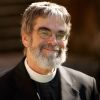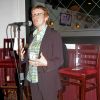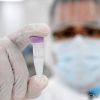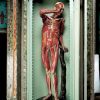Religion, science must unite to save environment
TORONTO - The difference between right and wrong could be the difference between life and extinction as Earth’s climate continues to spiral out of control, a Yale University professor of forestry and religious studies told a Toronto audience Nov. 9.
Mary Evelyn Tucker is the director of Yale’s Forum on Religion and Ecology and was a frequent collaborator with the late Passionist father of ecotheology Fr. Thomas Berry. Speaking on “Future Generations and the Ethics of Climate Change” at the invitation of the University of St. Michael’s College’s Elliott Allen Institute for Theology and Ecology, Tucker made the case for an alliance between the worlds of religion and science.
While science is more comfortable with descriptive than prescriptive words about nature and cautious scientists have been reluctant to tell politicians what to do, religion has only very recently begun to address the environmental crisis and ecotheology is still rarely spoken of in seminaries. However, the state of the world’s natural systems demands the best thinking of both religion and science, said Tucker.
“We have to say continually that religion is necessary but not sufficient. We have to develop partners in science, in law, in policy,” she said.
“We need humility. We don’t have all the answers because we were late in coming to this.”
Even if there has been a widening gap between science and religion in the modern era, the world now needs the “deep spiritual resources” of world religions that have dedicated millennia to thinking about right, wrong and the common good. Religion has the ability to teach humanity to value nature as the source of life, rather than a collection of resources to be fed into the gross domestic product of nations, she said.
“We have to see environmental degradation as an ethical issue,” she said. “Until now degradation has been seen as the inevitable cost of economic growth.”
The beginnings of an ethics that addresses climate change would be a serious look at distributive justice, according to Tucker. There are already winners and losers around the globe as sea levels rise, droughts devastate farm land and more violent storms create climate refugees from New Jersey to Bangladesh. But distributive justice should also mean extending the reach of human rights to future generations who will have to live in the environment this generation leaves them.
While an ethic of rights might set minimum standards, drawing lines which must not be crossed, a true environmental ethic would concern itself with much more than the minimum. As nature always seeks flourishing, so should our ethics.
Our ethics should be based on a clear-eyed view of human beings as a “small but indispensable part of a 14-billion-year evolution,” she said. “We need an ethic that is culturally aware but also universally compelling.”
VATICAN CITY - The discovery of a new sub-atomic particle -- the so-called Higgs boson -- may help scientists discover how the hidden structure of all matter in the universe works, a Vatican astronomer said.
"It indicates that reality is deeper and more rich and strange than our everyday life," U.S. Jesuit Brother Guy Consolmagno told Catholic News Service.
When people go about their everyday business working or relaxing, they don't think about the tiniest building blocks of physical matter, but "without these underlying little things, we wouldn't be here," he said.
Ethics of stem cell treatment debated in Toronto
TORONTO - Lorraine McCallum was diagnosed with multiple myeloma, a blood cancer of the plasma cells in the bone marrow, just days after the birth of her third daughter in 2009.
A stem cell recipient, McCallum shared the story of using her own stem cells for treatment at the deVeber Institute for Bioethics and Social Research's Café Scientifique, exploring the realities and ethical questions raised by stem cell research. The event was sponsored by the Canadian Institutes of Health Research.
"I'm not entirely sure why it works, but it does," she told the audience of about 100 gathered at Toronto's Fox and Fiddle pub July 3. "With multiple myeloma, they don't really know where it starts in the body or what triggers it but stem cell transplants are standard treatment… and it is effective at least for a while in holding the cancer at bay."
VATICAN CITY - A Vatican-sponsored congress on the ethical use of stem cells in scientific research was canceled because of a lack of funding, organizers said.
The Third International Congress on Responsible Stem Cell Research was to be held April 25-28 at the Vatican and was being organized by the Pontifical Academy for Life with the collaboration of the Vatican-based International Federation of Catholic Medical Associations, the Jerome Lejeune Foundation and the Bioethical Consultative Committee of Monaco.
Cutting-edge science: the church and the study of human anatomy
VATICAN CITY - Many readers of the Vatican's official newspaper might have been taken by surprise in mid-January by an article effusively praising a well-known exhibition of "plastinated" human bodies, which was making an extended stop in Rome.
"Body Worlds," which L'Osservatore Romano called a "wonderful ode to respect for the body," is an exhibition of preserved human corpses, displayed in often sporty stances.
Jesuit taking a scientific approach to prayer
PICKERING, ONT. - Believers in every religion and through every century of human history have done something they can’t quite describe, justify or do without. They pray.
They may meditate, contemplate, recite, babble or immerse themselves in silence. They may seek solitude or seek company to pray with others. They may follow the rules of a liturgy, improvise or seek a simple, direct encounter with God.
Prayer can be rote execution of routine, woven into the fabric of daily life. Or it can be a unique, creative leap into transcendence. Prayers may be led by a spiritual master, immersed in custom and culture or reach for an unconstrained, individual expression of the spiritual.







